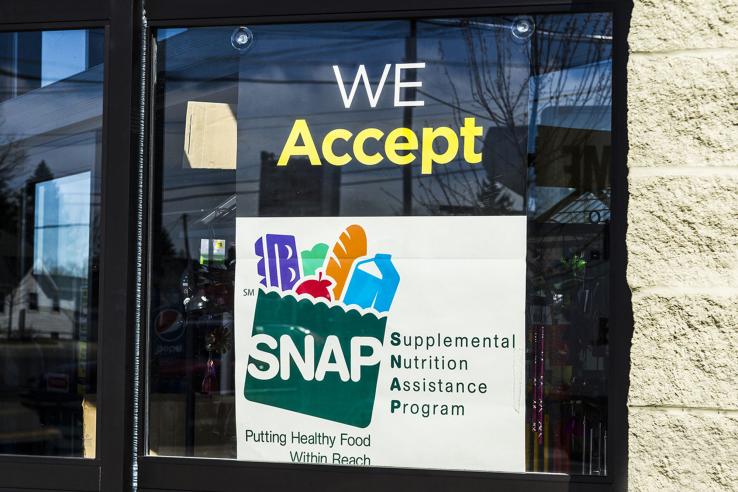April 2023 North America Newsletter

Good afternoon,
On May 11th, the national public health emergency declaration for the Covid-19 pandemic will come to an end. The public health emergency granted the federal government added flexibility to respond to the pandemic and made it easier for individuals to access key government programs such as expanding application waivers for the Supplemental Nutrition Assistance Program (SNAP) and keeping people continuously enrolled in Medicaid.
These programs are essential to promoting health and increasing economic stability for low-income Americans. SNAP is the nation's largest anti-hunger program, supplementing the food budgets of over 41 million low-income Americans in 2022; and over 92 million individuals in 2022 were covered under Medicaid, which provides insurance for low-income Americans who may not otherwise have access to care. Under pandemic-era flexibilities, uninsurance decreased and SNAP usage soared.
Now, these flexibilities are ending or have already ended, marking the start of a confusing and complex transitional period where many will lose access to important benefits. To thrive and be economically mobile, one has to be healthy, and to be healthy, one needs access to nutritious food and medical care. Limiting access to programs that provide these necessities at this moment will likely lead to short- and long-term impacts on economic outcomes and well-being, particularly for low-income communities and communities of color. During this critical juncture, non-profits, hospital systems, governments, and researchers have an important role to play in easing access to key government programs as the public health emergency ends.
In this month’s newsletter, we’re highlighting what J-PAL-affiliated researchers are focused on as the public health emergency ends, strategies to increase health insurance enrollment, and what evidence tells us about the benefits of being insured. If you’re interested in learning more about implementing evidence-based policies or evaluating your program as the public health emergency ends, I invite you to reach out. Let's work together to advance evidence and improve the well-being of millions of Americans.
Hannah Reuter
Manager of the US Health Care Delivery Initiative, J-PAL North America
Round-up: Work by researchers in the J-PAL network at the end of the public health emergency
In The Hill, Tatiana Homonoff (New York University) calls on states to ease application & re-enrollment policies to help prevent loss of benefits, drawing evidence generated by randomized evaluations. Meanwhile, two ongoing research projects, led by Rebecca Myerson (University of Wisconsin) and Timothy Layton (Harvard University) respectively, are evaluating outreach strategies to keep individuals insured as Medicaid continuous coverage ends.
New policy brief: The impact of nudges on health insurance enrollment
A new policy insight from J-PAL North America synthesizes evidence from eleven randomized evaluations on the effect of nudges on health insurance enrollment. Across the United States, 27.5 million people are not enrolled in health insurance. These evaluations consistently find that nudges have small but meaningful impacts both on encouraging individuals to enroll in health insurance or to switch to plans with lower out-of-pocket costs. They also indicate that nudges are particularly impactful at encouraging low-income populations to enroll. An accompanying blog post discusses how this insight contributes to the literature on administrative burdens in health coverage and highlights areas for future research. Read the blog >>
The effects of insuring low-income adults: Results from Oregon
A recently updated policy briefcase outlines key results of the landmark Oregon Health Insurance Experiment, led by Amy Finkelstein (MIT and Co-Scientific Director, J-PAL North America) and Katherine Baicker (University of Chicago). In 2008, the state of Oregon expanded Medicaid to a limited number of low-income, uninsured adults who were selected from a waitlist by lottery. This provided a rare opportunity for researchers to use the random selection of winners to understand the effects of Medicaid expansion. The experiment found that covering individuals under Medicaid increased the use of health care; diminished financial strain; and reduced depression. There was no measurable impact on physical health measures, employment, or earnings.
FEATURED EVALUATION SUMMARY
The effect of behavioral interventions on health insurance enrollment in Massachusetts
Many individuals who are eligible for subsidized health insurance options in Massachusetts as part of the Affordable Care Act (ACA) do not enroll in coverage. A J-PAL North America-funded randomized evaluation examined the impact of mailed reminder letters and a streamlined enrollment letter, where individuals were able to check a box and return the letter to enroll, on subsequent insurance coverage. Learn more about the results >>
FEATURED RESEARCH RESOURCE
Fifteen uses for published randomized evaluation data packages
The J-PAL dataverse is our primary location for publishing data and replication packages produced from the randomized evaluations that J-PAL affiliated researchers have run. To celebrate the dataverse’s fifteenth anniversary, a new blog post highlights fifteen use cases for this resource, including learning something new, conducting replication studies, getting summary statistics, and conducting secondary research.